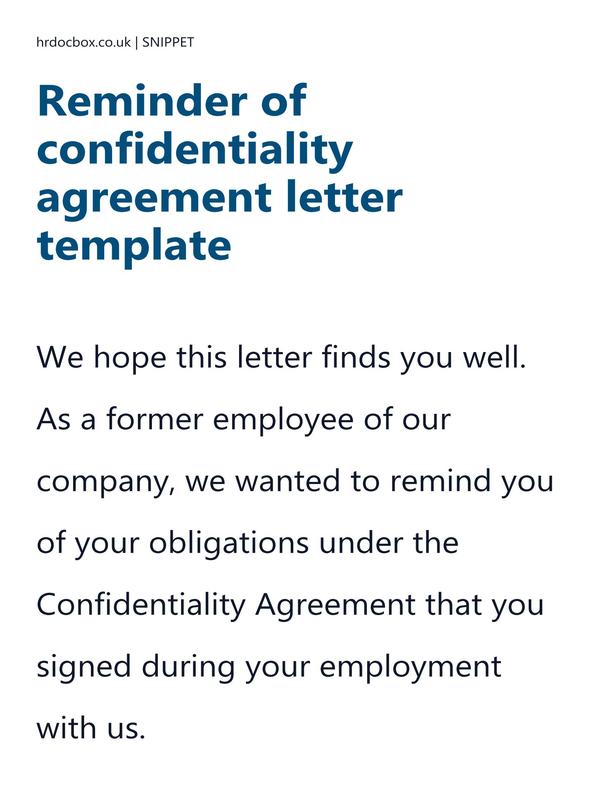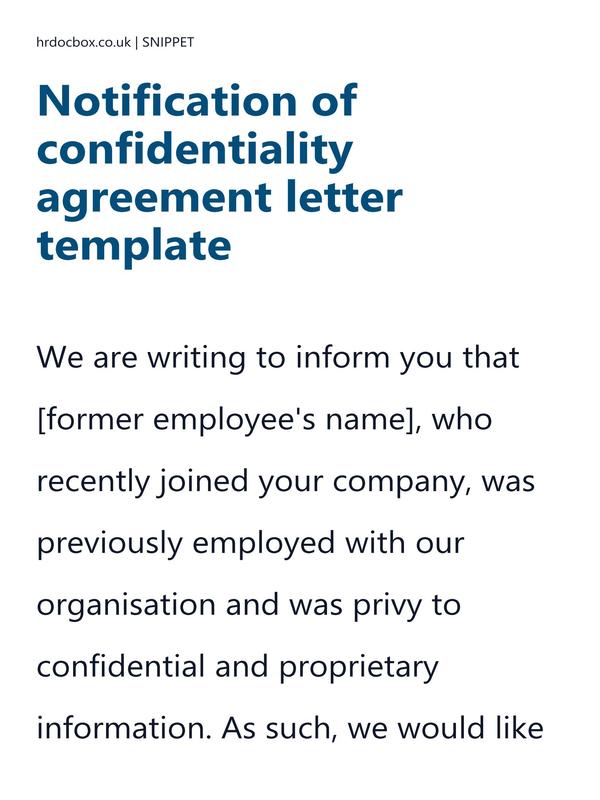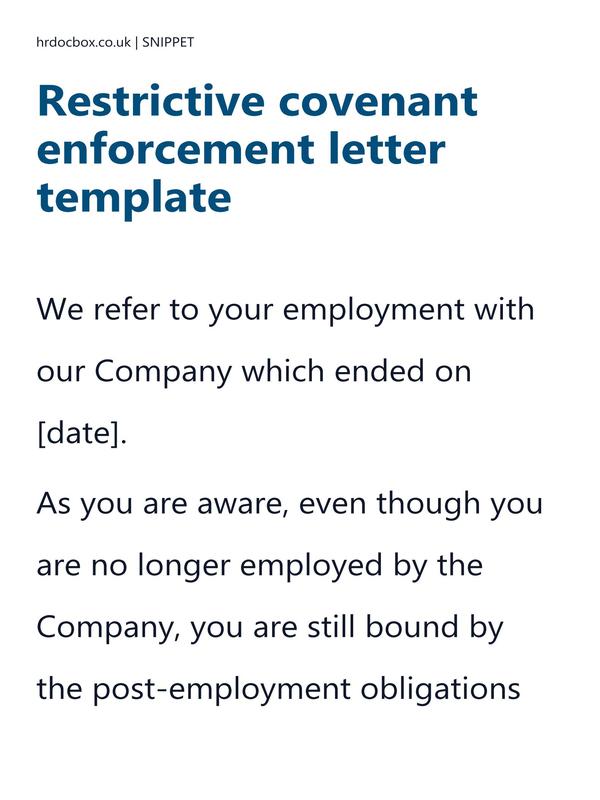Confidentiality templates toolkit
Our Confidentiality Templates Toolkit safeguards sensitive information, promoting data security and compliance measures.
Our customisable templates are designed to help you establish and enforce strong confidentiality agreements with your employees and contractors.
We understand that protecting your company's sensitive information is crucial to your success, and our toolkit can help you do just that. Our templates cover a range of topics, including non-disclosure agreements, confidentiality policies, and employee training materials, to ensure that everyone in your organisation understands the importance of confidentiality.
- 4 Confidentiality templates.
- Includes all Confidentiality templates, plus 12 months' access with all updates to the Confidentiality templates toolkit provided free of charge and notified to you.
- UK-specific accuracy.
- Instantly download templates as Word / PDF / plain text, or send by email.
- The Confidentiality templates toolkit will SAVE you up to 3 hours drafting & research. Save cost. Reduce risk.
Confidentiality
Employee confidentiality is usually used to refer to the confidential data that companies store of employees.
Companies have a responsibility to treat this data with sensitivity, and ensure that only authorised personnel have access to this data.
Robust and clear confidentiality rules help build trust between employer and employee. When there is trust between an employee and employer, information will flow more easily resulting in better communication and productivity. Failure to effectively manage confidentiality could result in a loss of clients and employees.
Confidentiality templates are essential for managing a low-risk, compliant Confidentiality process.
Compliance
Compliance
-
Employers have a duty to maintain the confidentiality of certain types of information, such as personal data of employees, customers, or clients, and sensitive commercial or financial information.
-
Employers should have clear policies and procedures in place for handling confidential information and ensure that all employees are aware of these policies and trained on how to handle such information.
-
Employers should limit access to confidential information to those who need to know it for the purpose of their job, and ensure that information is stored securely and protected from unauthorised access or disclosure.
-
Employers should obtain explicit consent from individuals before disclosing their personal data to third parties, unless there is a legal basis for doing so.
-
Employers should be aware of their obligations under data protection laws and ensure that any personal data they handle is processed in accordance with these laws.
-
Employers should have a clear procedure for reporting and investigating any breaches of confidentiality, and take appropriate disciplinary action against employees who breach confidentiality policies.
-
Employers should also ensure that confidentiality agreements are in place with employees, contractors, and other third parties who have access to confidential information, and that these agreements are regularly reviewed and updated as necessary.
It is important for employers to take confidentiality seriously and ensure that they are complying with legal requirements to protect sensitive information.
Key Confidentiality Case Law
Key Confidentiality Case Law
Navigating Confidentiality processes correctly is crucial to help you avoid any problems (which can be costly in terms of time, money and reputation).
Recent UK case law has highlighted key aspects of good Confidentiality management. Knowing how courts have handled claims can help you assess whether your proposed actions are likely to be seen as reasonable.
Here are some notable rulings and their implications:
-
Linklaters LLP v. Mellish (2019):
Facts: Mr. Mellish, a former employee of Linklaters LLP, intended to disclose confidential information about the firm’s culture and management practices after his departure. Linklaters sought an injunction to prevent this disclosure, citing breaches of confidentiality agreements.
Outcome: The High Court granted the injunction, reinforcing the principle that employees are bound by confidentiality agreements even after their employment ends. The court emphasized that disclosures which could harm the legitimate business interests of the employer must be prevented.
Key takeaway: This case underscores the enforceability of confidentiality agreements and the importance of protecting sensitive business information.
-
Trailfinders Ltd v. Travel Counsellors Ltd (2020):
Facts: Trailfinders Ltd claimed that former employees who joined Travel Counsellors Ltd took with them confidential customer information. Trailfinders sought an injunction to prevent the misuse of this information.
Outcome: The High Court ruled in favour of Trailfinders, granting the injunction and ordering the return of the confidential information. The court held that employees have a duty of fidelity which includes not using confidential information acquired during their employment for the benefit of a new employer.
Key takeaway: This case highlights the ongoing obligation of former employees to maintain the confidentiality of their previous employer’s information.
-
Bartholomews Agri Food Ltd v. Thornton (2018):
Facts: Mr. Thornton, a former employee of Bartholomews Agri Food Ltd, was accused of using confidential information to set up a competing business. Bartholomews sought an injunction to prevent the use of this information.
Outcome: The High Court granted the injunction, reaffirming the principle that employees must not misuse confidential information after their employment ends. The court stressed the importance of protecting business secrets and preventing unfair competition.
Key takeaway: This case underscores the necessity for employees to respect confidentiality obligations and the potential legal consequences of breaches.
-
ICAP Management Services Ltd v. Berry (2017):
Facts: ICAP Management Services Ltd sought an injunction against a former employee, Mr. Berry, who was planning to join a competitor and allegedly possessed confidential information that could be used to the detriment of ICAP.
Outcome: The High Court granted the injunction, emphasizing that the use of confidential information to benefit a new employer is prohibited. The court reinforced that even in the absence of explicit confidentiality clauses, employees have an implied duty to protect their former employer’s confidential information.
Key takeaway: This case illustrates the broad scope of confidentiality obligations and the court’s willingness to enforce them to prevent unfair competitive practices.
-
Argus Media Ltd v. Halim (2021):
Facts: Argus Media Ltd accused a former employee, Mr. Halim, of breaching confidentiality by disclosing sensitive pricing information to a competitor. Argus Media sought an injunction and damages for the breach.
Outcome: The High Court found in favour of Argus Media, granting the injunction and awarding damages. The court emphasized the critical importance of maintaining the confidentiality of sensitive commercial information and the severe consequences of breaches.
Key takeaway: This case demonstrates the legal protections available to companies to safeguard their confidential information and the potential liabilities for employees who breach these obligations.
-
OneTrust Technology Ltd v. Andrews (2022):
Facts: OneTrust Technology Ltd alleged that a former employee, Ms. Andrews, had taken confidential information to a new job at a rival firm. OneTrust sought an injunction to prevent the misuse of this information.
Outcome: The High Court granted the injunction, highlighting that employees are prohibited from using confidential information obtained during their previous employment to benefit themselves or a new employer.
Key takeaway: The case reinforced the principle that confidentiality obligations continue even after the employment relationship ends, and breaching these obligations can result in significant legal repercussions.
Instantly unlock with a purchase.
Instantly unlock with a purchase.
Frequently Asked Questions about Confidentiality templates
Frequently Asked Questions about Confidentiality templates
-
Can small businesses use these Confidentiality templates?
Yes. The Confidentiality templates in this toolkit are designed to be flexible and suitable for organisations of all sizes, including small businesses and charities. They follow UK employment law best practice, so even if you don't have an in-house HR team, you can confidently manage Confidentiality processes and issues.
-
Are these Confidentiality templates up to date for UK law in 2026?
Absolutely. All templates are drafted with the latest ACAS guidance and UK employment legislation in mind. We review and update them regularly, so you can be confident they remain compliant.
-
What types of Confidentiality letters and documents are included?
Every toolkit includes a complete set of editable templates, supporting documents, and manager guidance designed to save time and ensure compliance.
-
How will this help me as an HR manager or business owner?
Purchasing the toolkit saves you hours of drafting time and reduces the risk of legal mistakes. Instead of starting from scratch, you'll have clear, professional templates that you can adapt to your business.
-
Do I get instant access to the templates?
Yes. Once purchased, you'll be able to download the Confidentiality toolkit instantly. The templates are provided in editable Word or Excel format so you can customise them easily, and PDF format for easy sharing.
-
Can I preview a sample Confidentiality template before buying?
We provide free examples of our templates here. This gives you a sense of the quality and layout before you commit to purchasing the full toolkit.
-
What if I need a full HR toolkit, not just Confidentiality templates?
If you're looking for broader support, we also offer library bundles that include Confidentiality templates along with absence, grievance, and other HR policies. These may be more cost-effective if you need a complete HR library.
-
Why should I use these templates, and not AI to generate them?
The risk of using free AI-generated templates 'without review' includes your legal exposure, missing context, and no awareness of the wider process. Purchasing from us mitigates that risk.




